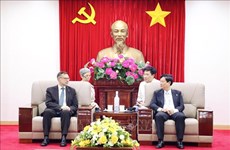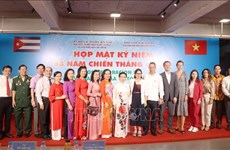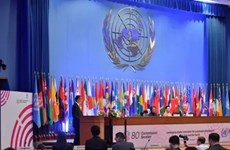New legal documents take effect in July
A range of policies took effect on July 1 including the revised Land
Law, a decree on methods to evaluate land prices, and a decree to
monitor multi-level marketing.
A range of policies took effect on July 1 including the revised Land
Law, a decree on methods to evaluate land prices, and a decree to
monitor multi-level marketing.
The revised Land Law, which has 14 chapters and 212 articles, clearly regulates the State's rights, obligations and its role in land management.
The law says the State has the right to decide on land planning, land use planning schemes and the amount of land allocated to a household.
It also says that land tenure, land allocation decisions and land lease and certificates on land use rights, will be decided by the State. Decisions to acquire land for the purposes of national defence, national security and socio-economic development for the national interest and for the public and others are also within the jurisdiction of the State, the law says.
It aims to get rid of cases of acquiring land which might negatively impact the rights and benefits of land users.
Land acquisitions must be done in a transparent manner with accountability, and compensation must be paid in accordance with the laws in order to ensure harmonious relations among the State, land user and investor.
The law extends the agricultural land use term of families and individuals, and expands the limit of land-use-right transfer of households and individuals to meet requirements of land accumulation for agricultural production towards modernisation.
Under Decree 44/2014/ND-CP, which has also become valid since July 1, there are five methods to determine land prices for specific types of land.
The direct comparison method is applied to determine land prices in cases where comparison is possible with land prices of areas that have been traded in the market, or in cases, where land use rights have been successfully auctioned.
The subtraction method is applied to determine land prices of areas with attached assets when there is sufficient data on similar areas, and when land has been traded in the market or land use rights have been successfully auctioned.
The income method is applied for areas wherein income derived from the land and land use expenses can be determined.
The surplus method is applied for areas with development potential as a result of changes in zoning or conversion of purpose, and when total revenues and expenses can be estimated.
The land price correction co-efficient method is applied in some specific cases required under the decree.
Decree 42/2014/ND-CP made it valid to properly monitor activities of multi-level marketing firms as well as protect people, who worked for the firms from scam or profiteering cases.
Goods that were banned from multi-level marketing included, medicines, medical equipment, pesticides, chemicals, and insecticides.
Decree 49/2014/ND-CP came into effect on July 1 to monitor and inspect state-owned enterprises in obeying regulations in six fields.
These included managing and using capital and state properties, the observance of financial regulations and supervision and arranging, innovating and strengthening the organisation and operation of enterprises.
These also included developing and implementing strategies and plans for investment and development of production. Recruiting and managing employers as well as evaluating, rewarding and disciplining them, also came under this Decree.
Another legal document also came into effect on July 1, notably Circular No 57/2014/TT-BTC regarding annual leave payment for civil servants and Government officers.
The circular said that since July 1, civil servants and Government officers, who work in remote areas, mountainous areas and islands could ask the leader of the organisation or department to grant the annual leave every three years and allowance to be paid along with that, instead of it being paid every year as before.
In the meantime, President Truong Tan Sang signed an order dated June 26 to promulgate the Law on amendments and supplements to the Law on Vietnamese Nationality.
The law, approved on June 24 by National Assembly deputies at their seventh session in the 13th tenure, contains changes to Articles 13 and 26 of the Law on Vietnamese Nationality.
The new Article 13 stipulates that citizens having Vietnamese nationality include those who have nationality by the effective date of this law and those who acquire nationality under this law.
Overseas Vietnamese, who have not yet lost Vietnamese nationality as prescribed by law before the effective date of this law, still retain their nationality.
Vietnamese residing abroad, who have not yet lost Vietnamese nationality and have no papers to prove their nationality as prescribed in Article 11 of this law, should make a registration with overseas Vietnamese representative missions to have their nationality recognised and their Vietnamese passports issued.
Clause 3 of Article 26 which was related to the failure to register for retention of Vietnamese nationality as prescribed in clause 2 of the old article 13 was annulled.
The amended law took effect from June 26.-VNA
The revised Land Law, which has 14 chapters and 212 articles, clearly regulates the State's rights, obligations and its role in land management.
The law says the State has the right to decide on land planning, land use planning schemes and the amount of land allocated to a household.
It also says that land tenure, land allocation decisions and land lease and certificates on land use rights, will be decided by the State. Decisions to acquire land for the purposes of national defence, national security and socio-economic development for the national interest and for the public and others are also within the jurisdiction of the State, the law says.
It aims to get rid of cases of acquiring land which might negatively impact the rights and benefits of land users.
Land acquisitions must be done in a transparent manner with accountability, and compensation must be paid in accordance with the laws in order to ensure harmonious relations among the State, land user and investor.
The law extends the agricultural land use term of families and individuals, and expands the limit of land-use-right transfer of households and individuals to meet requirements of land accumulation for agricultural production towards modernisation.
Under Decree 44/2014/ND-CP, which has also become valid since July 1, there are five methods to determine land prices for specific types of land.
The direct comparison method is applied to determine land prices in cases where comparison is possible with land prices of areas that have been traded in the market, or in cases, where land use rights have been successfully auctioned.
The subtraction method is applied to determine land prices of areas with attached assets when there is sufficient data on similar areas, and when land has been traded in the market or land use rights have been successfully auctioned.
The income method is applied for areas wherein income derived from the land and land use expenses can be determined.
The surplus method is applied for areas with development potential as a result of changes in zoning or conversion of purpose, and when total revenues and expenses can be estimated.
The land price correction co-efficient method is applied in some specific cases required under the decree.
Decree 42/2014/ND-CP made it valid to properly monitor activities of multi-level marketing firms as well as protect people, who worked for the firms from scam or profiteering cases.
Goods that were banned from multi-level marketing included, medicines, medical equipment, pesticides, chemicals, and insecticides.
Decree 49/2014/ND-CP came into effect on July 1 to monitor and inspect state-owned enterprises in obeying regulations in six fields.
These included managing and using capital and state properties, the observance of financial regulations and supervision and arranging, innovating and strengthening the organisation and operation of enterprises.
These also included developing and implementing strategies and plans for investment and development of production. Recruiting and managing employers as well as evaluating, rewarding and disciplining them, also came under this Decree.
Another legal document also came into effect on July 1, notably Circular No 57/2014/TT-BTC regarding annual leave payment for civil servants and Government officers.
The circular said that since July 1, civil servants and Government officers, who work in remote areas, mountainous areas and islands could ask the leader of the organisation or department to grant the annual leave every three years and allowance to be paid along with that, instead of it being paid every year as before.
In the meantime, President Truong Tan Sang signed an order dated June 26 to promulgate the Law on amendments and supplements to the Law on Vietnamese Nationality.
The law, approved on June 24 by National Assembly deputies at their seventh session in the 13th tenure, contains changes to Articles 13 and 26 of the Law on Vietnamese Nationality.
The new Article 13 stipulates that citizens having Vietnamese nationality include those who have nationality by the effective date of this law and those who acquire nationality under this law.
Overseas Vietnamese, who have not yet lost Vietnamese nationality as prescribed by law before the effective date of this law, still retain their nationality.
Vietnamese residing abroad, who have not yet lost Vietnamese nationality and have no papers to prove their nationality as prescribed in Article 11 of this law, should make a registration with overseas Vietnamese representative missions to have their nationality recognised and their Vietnamese passports issued.
Clause 3 of Article 26 which was related to the failure to register for retention of Vietnamese nationality as prescribed in clause 2 of the old article 13 was annulled.
The amended law took effect from June 26.-VNA












